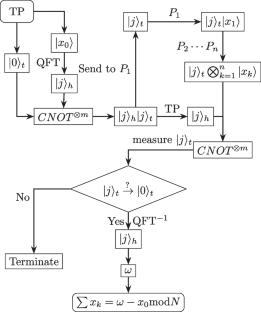Computational Geometry Based on Quantum Secure Multi-Party Summation and Multiplication
Abstract
Secure multi-party computational geometry is a crucial application domain of secure multi-party computation. Existing secure multi-party computation geometry protocols suffer from inefficiency and insufficient resistance to quantum attacks in computational geometry tasks. Meanwhile, quantum computing offers new possibilities to address these challenges through its inherent superposition and entanglement properties. To address the single-point trust risk in existing quantum summation or multiplication protocols, we redesign workflows by delegating critical tasks (quantum state preparation and result announcement) to a semi-honest third party. This prevents the initiator from accessing intermediate results while preserving the quantum-resistant properties of the underlying primitives. Based on this optimized framework, we construct efficient quantum-secure computational geometry protocols, including a two-party distance protocol and a polyhedron volume protocol with reduced third-party involvement. To our knowledge, we also present the first protocol for multi-party polygon area computation in quantum settings. The correctness and efficiency are formally analyzed, while heuristic security arguments against specific attacks are provided under defined assumptions.


 求助内容:
求助内容: 应助结果提醒方式:
应助结果提醒方式:


